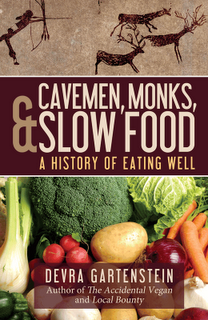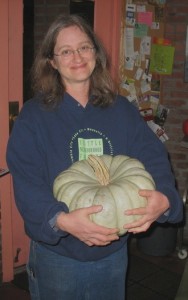 Cavemen, Monks, and Slow Food: A History of Eating Well, Devra Gartenstein (Quirky Gourmet Productions, 2011)
Cavemen, Monks, and Slow Food: A History of Eating Well, Devra Gartenstein (Quirky Gourmet Productions, 2011)
During the Middle Ages, when sugar was rare and expensive, rotten teeth were a status symbol. Today, sugar is so cheap that food manufacturers use it for filler and we rhapsodize about the fresh, local ingredients that medieval peasants grew in their kitchen gardens.
Cavemen, Monks, and Slow Food: A History of Eating Well tells the fascinating story of our relationship with our meals, from the Paleolithic hunters who painted their prey on remote cave walls, to the medieval monks who fashioned fine cheeses and wines, to the artisans and organic farmers who supply today’s trendy restaurants.
This book tells the riveting tale of our perpetually unfolding relationship with food, while offering needed perspectives on urgent modern concerns.
We spoke with Devra about her book, her philosophy, and her many projects bringing good food to Seattle. Here’s a synopsis of our discussion.
GoodFood World: Devra, you cover food across a period of hundreds of thousands of years; what made you tackle such a wide subject? How did you get your arms around it?
Devra: It started about 8 or 10 years ago, when I began reading everything I could about food history, food politics, and the sociology of food. I was reading to answer the questions, “Why do we eat what we eat? Why do we value what we value?”
Originally it was a survey of ideas: food and taste, food and politics, food and health. It really became unwieldy so I scrapped the whole thing and started over from scratch. I started telling it as a story from the beginning, and then the story lead me.
GoodFood World: The title of your first book, The Accidental Vegan, suggests that you might be vegetarian. Did you go into this project as a vegetarian?
Devra: No, I’m not a vegetarian now, nor have I ever been one. I started cooking vegetarian dishes because I found jobs in natural food co-ops. And I found that I was pretty good at it! It was a good niche to fill. I’m not trying to covert anyone; it’s just what I cook.
My food stand at local farmers markets and food-related events was vegetarian originally, until about a year ago. I’m not against meat per se; I just couldn’t serve meat I felt good about at prices I felt good about.
It’s interesting to see how emotionally charged the issue is. The reading I’ve done is pointing us to a diet that is more plant-based. We see meat as a special food, it is valued disproportionally. Part of the genius of the industrial food system has been to make meat cheap and readily available.
GoodFood World: You talk in your book about foods that have traveled back and forth across the Atlantic over centuries or those that moved from South America to North America. I was especially interested in Ozette potatoes raised by the Makah Indians on the Olympic Peninsula.
Devra: That’s right, the Spanish were here before the British. They came up the west coast sometime in the 1700s; then the Spanish left, but the potatoes stayed.
GoodFood World: What are your thoughts on today’s food system?
Devra: This is a transitional time and we need transitional food. The Slow Food movement, the locavore movement, and other “food movements” can be “all or nothing” approaches. That way of thinking is standing in the way of getting people to eat better.
I would love to see everybody eat fresh, local, and organic food, but until we get there, I would just like to see more people eat more lentils and fewer people eat industrial meat. The lentils don’t have to be organic, just not part of the industrial food system.
There is almost a fetishizing of local ingredients. The one person who can grow local ginger is almost a rock star. I don’t think that’s how we will get people to switch to eating better. It will be more people eating local lettuce or collard greens, instead of exotic or artisan items.
 About Devra Gartenstein
About Devra Gartenstein
Devra Gartenstein is the owner of Patty Pan Grill, a favorite Seattle-based farmers market business. She is the author of two cookbooks, The Accidental Vegan and Local Bounty, has dual master’s degrees in English and philosophy, and teaches regular cooking classes.
Monthly “Humble Feasts” are Devra’s way of introducing people to reasonably priced good food. She hosts local buffet dinners in two locations in Seattle where five courses are served for $12. The dinners are the embodiment of her philosophy. How does she do it? Keep it simple, make thoughtful compromises when necessary, use meat sparingly, and barter and glean.
Visit Devra’s website and read about Humble Feasts at QuirkyGourmet.com.
